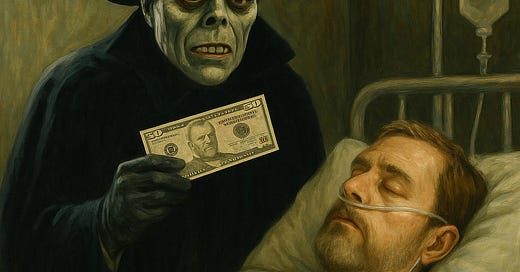There should be a plaque somewhere—perhaps on a cracked park bench or behind a jury-rigged AV cart—inscribed with this truth: No good deed goes unpunished.
I learned this early. As president of my college student government, I had a moment of inspiration: why not help the film studies department rent a copy of the original Phantom of the Opera for a public screening? It was a classic! A cultural enrichment opportunity! And it was only $50, which barely bought three pizzas and a warm 2-liter back then.
Unfortunately, my enthusiasm outpaced my grasp of parliamentary budgetary protocol. That fifty bucks? Technically misappropriated. An honest mistake.
I was too busy fighting off that guy with the scythe—I had meningitis—to prepare a proper defense against impeachment.
My vice president, a petty little man with a Napoleon complex and the political instincts of a scorpion, seized the moment. He waited until I was hooked to IV fluids and then filed the paperwork. And the student senate? They voted me out. For trying to bring a little silent-cinema joy to campus.
To this day, I hope Lon Chaney haunted their dorms.
In the aftermath, still weak from the illness and stunned by the swift political knifing, I had a brief hallway encounter with one of the university’s vice presidents—a former state legislator known for chomping cigars and dispensing homespun wisdom like a low-budget LBJ. He looked at me, shrugged, and said:
“No good deed goes unpunished.”
It was the first time I’d heard that phrase.
It wouldn’t be the last.
And I’ve since learned that life has a remarkable way of punishing the helpful.
Take, for example, the coworker you try to help. I once came across a timely news story that connected directly to something a former coworker was working on. I didn’t just send the link—I highlighted the most relevant part, pasted it right into the message, and gave a quick note on why it might be useful.
Their response?
Thanks for forwarding. I don’t see a connection with the other person mentioned in the story, but I’ll make note of the one that is.
As if I had asked them to publish irrelevant content instead of simply offering something helpful on a silver platter. It wasn’t a suggestion to shoehorn in a random name—it was a heads-up. A helpful one.
It’s a special kind of discouragement—the kind where your initiative gets met not with gratitude or collaboration, but with a shrug wearing business-casual.
That’s such small ball compared to some real-life good Samaritans punished for being decent human beings:
Oliver Sipple – Hero, Then Betrayed
In 1975, Sipple stopped an assassination attempt on President Gerald Ford. A hero, right? Unfortunately, the press outed him as gay—without consent—turning a private citizen into a public controversy. His act of courage was rewarded with personal and familial estrangement.
Tomas Lopez – Lifeguard Fired for Saving a Life
While on duty in Hallandale Beach, Florida, Lopez dove in to rescue a drowning man—outside his assigned area. He saved the man’s life and was promptly fired for violating protocol. His employer cited liability concerns. Humanity be damned.
Arnold Abbott – Arrested for Feeding the Homeless
Abbott, 90 years old, served food to the homeless in Fort Lauderdale and was arrested—not once, but multiple times—for violating a local ordinance banning food distribution in public spaces. Because heaven forbid anyone be publicly nourished.
Paul Gaylord – Saved His Cat, Got the Plague
In a tragicomic twist, Gaylord tried to dislodge something from his choking cat’s throat. The cat bit him. The bite gave him the actual bubonic plague. He spent nearly a month in a coma. His reward for love? A near-death experience and a Darwin Award runner-up certificate.
So what’s the takeaway here?
Well, in an ideal world, kind gestures would be rewarded. Helping others would earn you trust, not suspicion. Emails would be read. Silent films would be shown and nobody would get meningitis and a political takedown in the same semester.
As Thomas Aquinas once wrote:
“No good deed is unrewarded, and so every good deed merits some good.”
— Summa Theologica
Beautiful thought. But then again, Aquinas never had to email a helpful link to a finicky coworker or rent a silent film with student government funds.
The world may not run on merit, but that doesn’t mean we stop trying. Even if the reward isn’t applause—it might just be knowing you did the right thing.
Or, more realistically, that you’ve earned a few good ghost stories for the podcast.
Should you stop trying? Give in to cynicism? Let the coworker flounder, let the cat choke, let the film students go without their grainy Lon Chaney terror?
Of course not. That’s not who we are.
But it wouldn’t hurt to document everything, keep a receipt or two, and maybe, just maybe, wait until your fever breaks before trusting the vice president.
Because if no good deed goes unpunished, you might as well pick your punishments with style.




